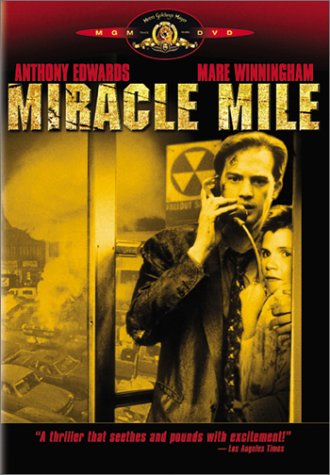The 1991 film, Popcorn, tells the story of what happens when an experimental film goes wrong.
In the late 60s, a freaked-out hippie named Lanyard Gates directed a short film called Possessor. Possessor featured footage of him apparently preparing to sacrifice a woman on an altar. Gates declined to film a third act conclusion to the film. Instead, he murdered his family on stage and in front of a terrified audience. The resulting panic caused a fire to break out, killing almost everyone at the Dreamland Theater. As a result, Possessor has become a legendary film, one that is believed lost. Of course, it’s not lost, as a group of film students and their professor find out over the course of Popcorn.
Years later, one of those film students, an aspiring screenwriter named Maggie (Jill Schoelen), has been having disturbing nightmares about being caught in a fire and being pursued by a madman. When she sees Possessor, she realizes that much of the imagery in her dreams comes from the film. When Maggie attempts to talk to her mother about all of this, Suzanne (Dee Wallace) denies knowing anything about Possessor or Lanyard Gates but it’s not hard to tell that she’s lying.
Still, Maggie does have other things to worry about. Her school’s film department has been hit by budget cuts and neither she nor her classmates will be able to make their student films unless they raise some money. One of the students, Toby (Tom Villard), suggests holding a fundraiser at the Dreamland Theater, where they could show old movies and even recreate some of the old gimmicks that were used to promote those movies. Professor Davis (Tony Roberts) thinks that is a great idea! Why, he could even control the giant, remote-controlled bug that was used to promote Mosquito!
Filmed in Jamaica (and featuring a somewhat random performance by a reggae band), Popcorn was originally offered to director Bob Clark. However, Clark didn’t want to return to the horror genre so, instead, it was Clark’s frequent collaborator, Alan Ormsby, who was hired to direct the film. Reportedly, Ormsby was replaced a few weeks into filming by Mark Herrier, with the assumption being that the producers felt that Ormsby was spending too much time on filming the three fake movies that are screened during the fund raiser. Those films are Mosquito, The Attack of the Electrified Man, and a dubbed Japanese film called The Stench. In the film’s credits, Ormsby is credited with directing the three fake film while Mark Herrier is credited with directing the “modern” scenes.
Perhaps not surprisingly, the three fake film are actually the best thing about Popcorn. If Alan Ormsby was taking a lot of time to shoot the fake films, it obviously paid off because all three of them perfectly capture the feel of the era when they were supposedly shot and all of them are filled with the type of details that only a true fan of old horror movies would think to include. Mosquito is a giant bug film that feels as if it could have come straight from 1957. The Amazing Electrified Man feels like one of the films that poor Lon Chaney Jr. would have found himself starring in after leaving Universal. And The Stench is the perfect import — slow-moving, a bit pompous, and terribly dubbed.
As for the rest of Popcorn, it’s a well-made slasher film. Mark Herrier did a good job directing the “modern” scenes, with a scene in which the killer’s face seems to literally melt after he kisses one of his victims being a definite creepy highlight. The kills are reasonably creative and, in one case involving electrocution, rather disturbing. Jill Schoelen is a likable heroine, Derek Rydall is cute as her hapless boyfriend, and Tom Villard’s uninhibited performance gives the film a much-needed jolt of energy. Though the old films may be the highlight of Popcorn, the “modern” scenes hold up as well.

